Where In The World Was Bill DeBlasio?
Bill DeBlasio is facing criticism for the fact that he was off in Iowa on his quixotic Presidential campaign rather than being at home during Saturday's blackout.
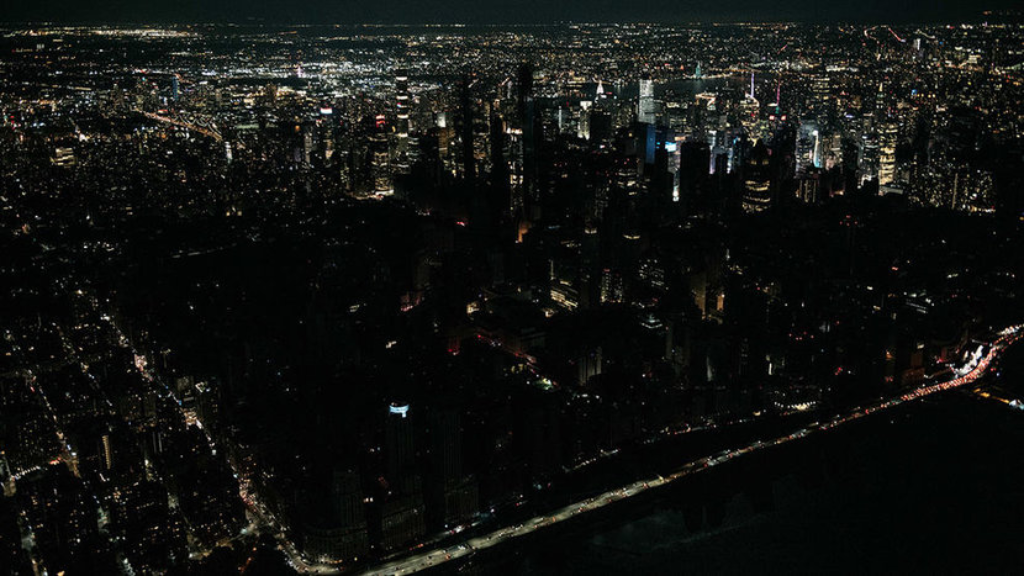
New York City Mayor, and quixotic Presidential candidate, Bill DeBlasio is coming under fire for the fact that he was out of town during Saturday night’s blackout:
In a union hall lobby in Waterloo, Iowa, Mayor Bill de Blasio slouched down into a corner, his presidential stump speech safely delivered, but with a more pressing issue at hand.
About 1,000 miles away, large swaths of Manhattan’s West Side were still enveloped in darkness by a massive power failure, and Mr. de Blasio had to decide whether to immediately return to New York. He did not have enough information, he told reporters in Iowa on Saturday, and would decide later.
As Mr. de Blasio dithered, others in New York stepped in.
Corey Johnson, the City Council speaker, gave frequent updates on Twitter regarding the scope of the blackout. Mr. Johnson had been in Long Island when the blackout started, but returned to the city after the news broke.
A news conference held in the Upper West Side was attended by numerous elected officials, including the city comptroller, Scott M. Stringer; the public advocate, Jumaane D. Williams; and the Manhattan borough president, Gale A. Brewer.
From Albany, Gov. Andrew M. Cuomo deployed 200 state troopers and 50 light towers to the blackout area, and directed the Public Service Commission to investigate the cause of the power failure. By night’s end, Mr. Cuomo was in the city, touring the substation believed to be the cause of the problems, with the Con Edison chief executive, John McAvoy.
By then, Mr. de Blasio had decided to return, leaving for a four-hour car ride from the Iowa union hall in, of all places, Waterloo. He arrived in Chicago at 1 a.m. Sunday, and flew back to New York hours later.
The episode, much like a police-involved shooting of a black man in South Bend, Ind., did for Mayor Pete Buttigieg, illustrated the challenges faced by mayors who take leave of their cities to launch presidential bids.
That challenge is more fraught for Mr. de Blasio, who is at near zero in most polls but continues to campaign in states like Iowa, where he brought his son, Dante, and in South Carolina, where his wife, Chirlane McCray, was this weekend.
“I want people to understand that in this job and any public C.E.O. today, you have to take charge wherever you are and I did that,” Mr. de Blasio said at a news conference in Manhattan on Sunday. “In terms of the decision, as soon as it became clear that we did not have an immediately resolvable crisis, I started moving.”
But the mayor’s absence, as well as his initial indecision, came under heavy criticism on social media, and was alluded to by fellow Democrats, including Mr. Cuomo, who has often feuded with the mayor.
“Mayors are important,” Mr. Cuomo said in an interview on Saturday on CNN. “Situations like this come up and you have to be on site, I believe that.”
“I’m governor of New York, I have been for eight years,” he added. “I can count the number of times I leave the state, basically on my fingers.”
Mr. Williams, the public advocate, said that he “felt during a situation like that, the city deserved to see their government present,” adding that he was “ready to step in,” if necessary. “It exposes the difficulties of being the mayor of New York City and applying for another job,” he said.
Mr. Stringer praised emergency management officials and the mayor’s staff but said Mr. de Blasio’s presence was missed during the meeting with emergency management officials.
“When the mayor walks in the room, he or she is the one charge,” Mr. Stringer said. “It is just better when the guy in charge is in the house.”
Mr. de Blasio has spent at least a month traveling around the country since he announced that he was exploring a run for president earlier this year. He formally announced his candidacy in May. He stepped up his travels in early July, campaigning in Chicago, Houston, New Orleans, Iowa and South Carolina.
So far, Mr. de Blasio has avoided having to deal with a major crisis while he was out of town, but there have been close calls. In February, when he was still exploring a run for president, Mr. de Blasio canceled a trip to New Hampshire after a veteran New York Police Department detective was killed while responding to a robbery.
That decision was apparently more clear-cut than the one he faced on Saturday. At first, the mayor was told by officials that the blackout was limited to about 20,000 customers and a relatively small area. An hour later, that number had doubled.
By 9:30 p.m., Mr. de Blasio was getting reports that 72,000 customers were affected.
“Once he learned that this was going to be a bigger problem than originally thought, he made the decision to come back to New York,” said Freddi Goldstein, Mr. de Blasio’s press secretary.
But there were no immediate flights available in Iowa, so Mr. de Blasio was driven 300 miles to Chicago. Even so, Mr. de Blasio was not able to board a flight back to the city until Sunday morning.
To be fair to DeBlasio, there’s very little he could have done if he had been home in Grace Mansion that he wasn’t able to do via phone conference and other methods of communication with the deputies who would have been briefing him were he actually in the city. After all, it’s not as if the Mayor was going to go underground and fight the transformer fire that apparently caused the outage or that he was going to don Con Ed worker’s apparel and lead the effort to get the electricity back on. His job, whether he was in New York City or Iowa was to lead the city, allocate resources and make the decisions and give the orders that his deputies would then carry out. Presumably, he was just as able to do that over the phone as he would have been had he been there in person.
All that being said, there is a symbolic value in having a Chief Executive, whether it’s a Mayor, Governor, or President, who is visibly on the scene and seen by the people as being in charge of a crisis that was affecting a wide swath of the jurisdiction they lead. This is especially true of Mayors, and there have been many times over the years where a Mayor has seen their political fortunes fall apart due to a bad response to something as simple as a snowstorm in a city accustomed to getting snow on a regular basis in the winter. In Bill DeBlasio’s case, it is potentially even more dangerous because it comes in the context of poll numbers back home that have gotten increasingly worse since he launched his Presidential bid. The only good news for the Mayor at this point is that he is term-limited and in the middle of his second term, so he can’t run for re-election in 2021 anyway.
This, of course, is the risk that a sitting Chief Executive at any level takes when they run for President. Unlike legislators, who can fly back and forth between campaign stops and their respective capitals when needed to conduct legislative business, Mayors and Governors are on duty at all times and expected to be responsive at moment’s notice in the event of some crisis that occurs. This can be anything from a natural disaster to a blackout to, as DeBlasio’s fellow Mayor and candidate Pete Buttigieg found out over the course of the past month, a controversial police shooting.
In addition to the fact that DeBlasio didn’t make it back to New York until after the blackout was basically over, he’s also being criticized for his indecisiveness about returning at all. Had he made the decision to return when he was first informed about what happened, he most likely would not be getting the criticism he’s getting this morning. Instead of doing that, though, he dithered in a union hall in rural Iowa to the point where he had to be driven to Chicago to catch a plane back to the city. That’s the same kind of indecisiveness that has marked his tenure as Mayor as a whole, and it’s unlikely to help him either back home or in the race for the Democratic nomination. Of course, DeBlasio was never likely to win that race to begin with. He’s currently polling somewhere around 0% and it seems unlikely that he’s going to rise significantly at any point in the future. Perhaps he just needs to go home and finish out his final term in office doing what the people of New York elected him to do.

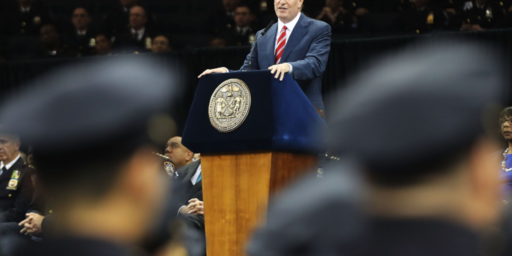
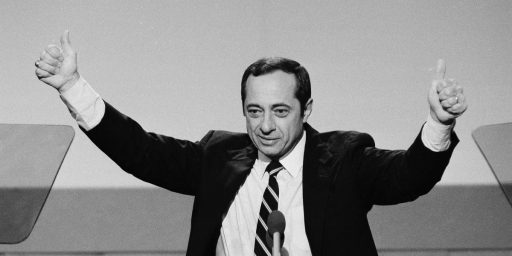

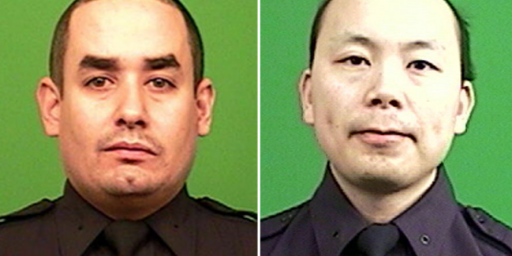
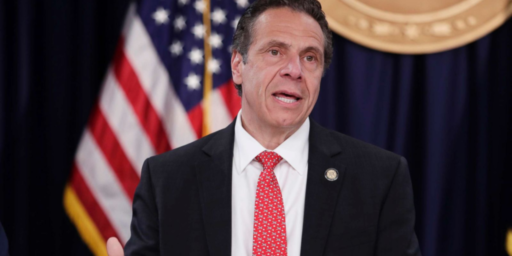
In the middle of nowhere… I mean Iowa.
@OzarkHillbilly:
Same difference.
(Apologies to Iowa)
@Doug Mataconis:
Yeah, I kinda hated to make the joke. Parts of Iowa are stunningly beautiful (the parts that aren’t covered in corn and soybeans anyway) and the people are for the most part friendly and accommodating.
What’s the best thing to come out of Iowa?
An empty bus…
I don’t have any feelings about Deblasio, but this comment doesn’t make much sense to me. If he would have toured the failed power substation instead of Cuomo, I don’t think power would have been restored any faster. Yes, there are situations that require hands on management, but we all have communication devices that mean that our office is always with us. We have lots of photo-ops that don’t do anything nor mean anything in our world.
Proper delegation of authority and channels of responsibility are important qualities of leadership. We can’t have a situation where the helm of a big city requires around the clock attention of a single person.
@Slugger: Exactly! The real story here is that he dithered around wondering–apparently out loud enough so that people noticed–should I stay or should I go. It makes him look not very leader like.
While there’s little de Blasio could have done in this circumstance (other than maybe sacrificing a groundhog to propitiate the electricity gods), this touches on a pet peeve of mine: sitting politicians running for office. Running for President is a full time job and then some. There are a lot of states, cities and districts not getting their money’s worth out of their elected officials because those elected officials are feeding their egos with doomed Presidential runs.
After this, I’m not sure if he’s gonna be President.
@Hal_10000:
I don’t know how you could word it without it becoming a first amendment issue, but I would definitely support a rule whereby it is illegal to run for elected office while you hold a different elected office. I don’t think even taking a leave and sacrificing your salary is enough, because you are still depriving your constituents of the representation you were elected to provide. To me this is not just about money.
I think everyone is entitled to vacation and to get away, and had de Blasio been away for that reason it is fine. But if I am away from work when something goes wrong, even if I couldn’t have stopped it, because I was away interviewing for another job? I would be fired and deserve it.
I’m reminded of John McCain. During the financial crisis in 2008 he made a big deal out of suspending his campaign and flying to DC to do something or other about the crisis because, he said, you can’t phone these things in. He then reportedly sat in his apartment in DC calling people.